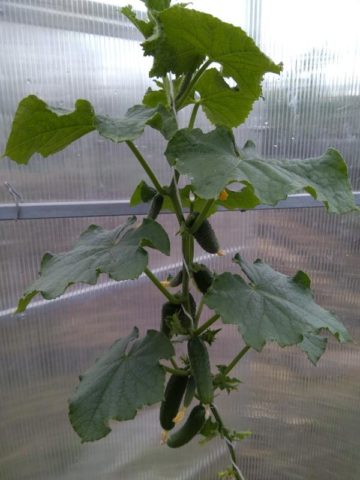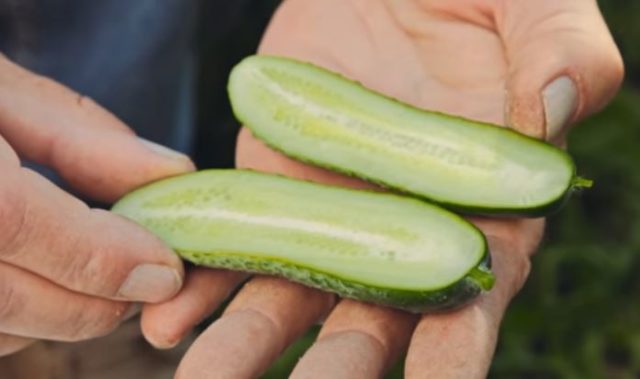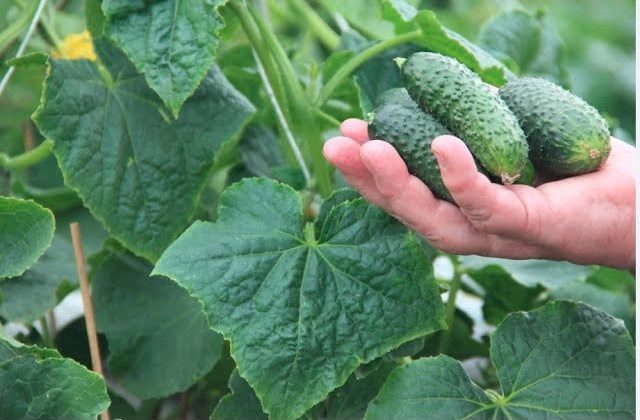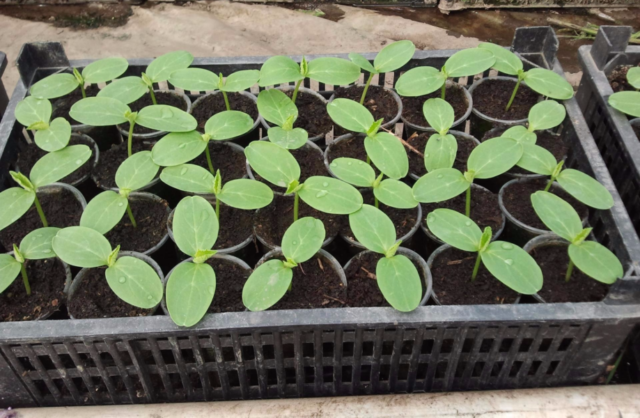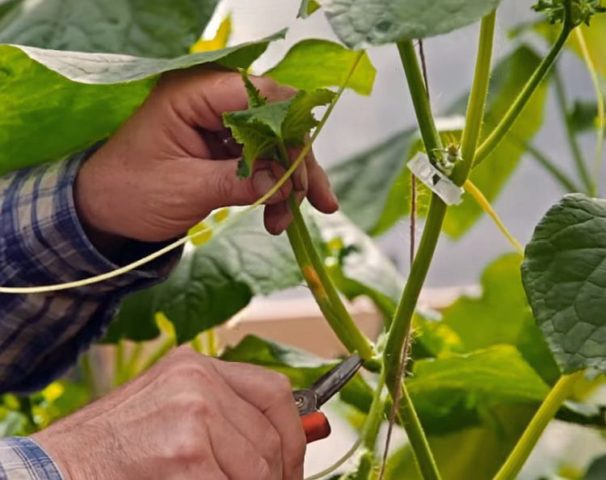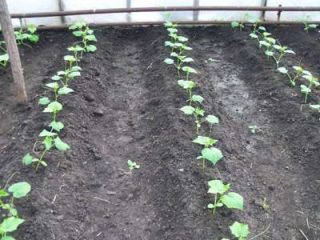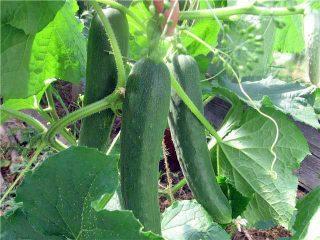Content
Almost every gardener has their own favorite varieties of cucumbers. These can be earlier varieties or late maturing, depending on the purpose of their cultivation. Cucumber Shosha F 1 is a domestic hybrid and is popular with many gardeners.
Breeding history of the variety
This is a hybrid variety that was bred by domestic breeders. The agrofirm "Partner" was engaged in breeding, which conducted tests of the Shosha cucumber variety on open and protected soils, mainly in the non-chernozem zone of Russia. Therefore, these cucumbers are best grown in these climatic conditions.
The originator of the variety is Blokin-Mechtalin Vasily Ivanovich. The variety is included in the State Register of the Russian Federation for growing in open ground and under a temporary film cover.
Description of cucumbers Shosha f1
The plant of this variety is medium-sized. The main stem reaches a length of 1.5–2 meters. The root system is strong and the side shoots are short.
The flowering type is female, the flowers do not need insect pollination. The flower has the shape of a crown, bright yellow in color. Productivity with quality care rises to 18 kg per sq. m.
Up to 4 zelents are formed on one node, but more often in a node 1-2 flowers. The leaf of the plant is green, of medium length.
Description of fruits
The fruits have good taste, in addition, the fruit is classified as salad. The color of this variety is dark green. The surface of the cucumber is bumpy and pubescent. According to the description, the Shosha cucumber has a thin skin, in which the taste of bitterness is completely absent. The color of the pulp is light green. The cucumber is elongated, about 10 cm long and 3 cm in diameter. The approximate weight of the fruit is 50 grams. The seeds are small and tender.
Characteristics of Shosha cucumber
The main advantage of the variety is its high yield and good taste. Most gardeners respond positively both to the timing of ripening and the characteristics of fruiting.
Productivity and fruiting
The highest yield in cucumber is still manifested in greenhouse conditions, although a fairly large crop can be harvested in the open field. It takes about 40 days from the emergence of seedlings to the formation of the first zelents. With good care and high-quality agricultural technology, Shosh can yield a yield of 12-18 kg per square meter. It is important that the planting density is no more than three plants per 1 sq. m. The yield of Shosha cucumbers, both according to reviews and in the photo, is high during the entire growing season.
The yield is directly influenced by temperature, humidity, as well as the stability of the environment. Therefore, in greenhouses, the yield of Shosha cucumbers is obtained, according to reviews, more, since the temperature there is stable throughout the growing season.
In a cool room, the harvested crop can lie for up to two weeks, in addition, it lends itself perfectly to transportation.
Application area
The variety is considered a salad variety, but in fact, its scope is wide. Small gherkins taken at the zelentz stage are quite suitable as material for pickling and other types of home canning.
Disease and pest resistance
This is another plus of this hybrid. Shosha cucumber is resistant to most viral diseases that are inherent in cucumbers. The variety is resistant to cucumber mosaic, to yellowing of veins on fruits, as well as to powdery mildew.
There are some types of pests that are capable of attacking and parasitizing the Shosha cucumber. First of all, it is a leaf roll. But when applying simple preventive measures, the gardener can resist their attack.
Advantages and disadvantages of the variety
The gardeners who planted the Shosha cucumber note the complete absence of negative aspects. Among the advantages:
- excellent taste;
- widespread use;
- high level of keeping quality;
- good indicators of transportability.
All this makes the Shosha cucumber from the Partner company an excellent variety for both home and industrial cultivation.
Growing cucumbers Shosha
Firm "Partner" bred Shosha cucumbers so that they could be grown both in the greenhouse and in the open field and even on the windowsill at home. It is important to choose the right seedlings and provide the plant with high-quality agricultural technology.
Planting seedlings
You can plant cucumbers of this variety both by seedlings and using seeds. The algorithm for growing seedlings is as follows:
- You need to take a small box and put the seedling soil there.
- The seeds should be at the bottom.
- It should take 4 weeks before planting in open ground.
But in any case, according to reviews, it is recommended to plant seedlings of the Shosha cucumber variety not earlier than in mid-April.
For planting in open ground, the seedlings should be hardened. To do this, the boxes with seedlings are put outside for an hour. Gradually, the time increases until future cucumbers will not spend in the fresh air for up to 6 hours.
You can plant cucumbers at a time when the temperature becomes about 16 ° C and will stably keep at this indicator. The soil must be dug up interspersed with humus and chicken droppings, especially for transplanting Shosha cucumbers f1. Feedback on planting with such a top dressing is positive.
Seedlings need to be planted according to the scheme so that 1 m2 there were no more than 5 plants. This is optimal for both open ground and greenhouse conditions.
Growing cucumbers using a seedling method
When sowing seeds in open ground, it is necessary to meet the terms so that they are not affected by the cold temperature during germination. This is usually no later than April 15th. The soil must first be thoroughly processed, since the cucumber loves light and fertile soil. The best precursors for cucumbers are legumes, early cabbage, onions and garlic, and greens.
The soil is prepared three weeks before planting. Compost, rotted sawdust, manure, horse manure, as well as peat and dolomite flour are brought in.
After three weeks, you can sow seeds that should be soaked beforehand. Those that fall to the bottom in water at room temperature are of high quality. Floating on the surface - discard.
Follow-up care for cucumbers
Cucumbers require some maintenance as they grow. If you follow all the rules, then in the end the harvest will be good and the taste is excellent. The leaving process includes:
- moderate but daily watering;
- during the growth period, use liquid fertilizers for feeding;
- weed - once a week;
- it is worth tying up a bush for greater productivity.
Bush formation
It is imperative that cucumbers carry out pinching, that is, the removal of unnecessary shoots.
You need to remove extra shoots in the axils of 3-4 leaves, as well as lateral shoots in the axils of 5-6 leaves. It is important not to confuse or remove shoots with ovaries. Stepchildren should be at least 4–6 cm long. But it is not recommended to leave long shoots either. If they are up to 20 cm, then the gardener will not get part of the crop in any case, since the stepsons will draw on some of the nutrients.
Conclusion
According to the characteristics and description of the variety, the Shosha cucumber is popular and quite fruitful. This is an early ripe hybrid that is used both in industrial production and for growing at home. Agricultural technology is not difficult, and disease resistance allows you to grow without additional costs.The Shosha cucumber in the video is described in detail and shown so that inexperienced gardeners know how to grow it.
Testimonials
